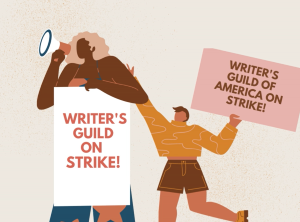There’s no shortage of drama in Hollywood these days. And I don’t mean in front of the camera. I’m referring to the drama that seems to be increasing as more shows stop filming: the Writers Guild of America strike.
The WGA is the labor union representing over 15,000 writers working in entertainment. When negotiations on a new signatory contract with the AMPTP – the trade group representing major networks and studios – cratered, WGA leadership authorized a strike to begin on May 2nd, the first day after their old contract expired. The whole situation has left some scratching their heads. What’s this really about, when will it end, and does it affect me, even if I’m not in the WGA? All good questions. Let’s take each one separately.
What’s the strike about?

A large amount of content has migrated away from traditional networks and onto streaming platforms where old residual models are obsolete. Writers are paid every time a show airs on TV, such as through reruns or syndication, but streaming has no corresponding metrics since shows on those platforms are played at the whims of individual audience members. A WGA strike in 2007-08 was an effort to include streaming – then called “new media” – into their basic agreement, but terms wound up only affording minimal protections, as no one knew how prolific streaming would become.
Moreover, streaming shows tend to use smaller writer rooms than the old network shows (what we call “mini rooms”) and shoot fewer episodes (perhaps eight instead of 24), meaning fewer writers are being employed, and over shorter periods of time. As such, the guild wants “span protections” that guarantee writers will be employed for a minimum number of weeks on a given show. Also of concern is the use of A.I. to replace screenwriters.
When and how will it end?
The AMPTP claims studio profits are down as shareholders pull capital, theatrical attendance dwindles, audience attention fractures, and an ever-changing media landscape upends their revenue models. In addition, they claim WGA proposals force them to employ writers even if their services are not required. In short, this is not two parties separated by the LA River, but rather the Grand Canyon. There’s no real precedent here, and no amount of noodling with the existing contract is going to fix the problem.
Whole new models are going to have to be created to deal with these issues, which will take a while to figure out, and that process can’t start until both parties sit down and start talking again. But as long as the studios have enough content to keep their slates full, whether through stockpiling scripts or reruns or non-union formats like reality and animation, they have little incentive to rush back to the table. Expect this strike to last many more months.
How does it affect me?
Obviously, if you’re a WGA member, you have to put your pen down. Any members caught crossing picket lines can be fined, blacklisted or expelled from the guild. But what if you’re not a WGA member? Can the strike affect you? The short answer is yes, in several ways:
– Production companies who are not WGA signatories do not have to abide by the strike. That means they may still be looking to hire non-union writers for film and TV content even as the strike drags on. While you also have no legal obligation to the strikers, news travels fast in Hollywood, and some people have long memories, so you may not want to be remembered as failing to support your fellow writers.
– The WGA is taking note of non-union writers who perform writing work for struck companies and has threatened to blacklist those individuals from joining in the future. While it’s a legal gray area whether they can truly do that, it might not be worth the risk if you have dreams of becoming a member one day.
– Once the WGA does eventually lock a deal, they can force signatory companies to refrain from working with writers on their blacklist.
– Even negotiating, pitching, taking notes or otherwise discussing future writing assignments with a struck company is prohibited under WGA rules, so it’s best to desist from any such dealmaking until the strike ends.
Any good news?
Yes! There are some things you can do in the meantime.
1) Supp ort your fellow writers as they seek a fair and equitable deal from their employers, either on picket lines or social media.
ort your fellow writers as they seek a fair and equitable deal from their employers, either on picket lines or social media.
2) Commercials, video games and certain types of animation are not part of the strike, so work can still be done in those areas without fear of reprisal.
3) The strike is a wholly American phenomenon, so writing assignments for foreign-based companies are fair game.
4) You can spend this time at home developing, honing, writing and rewriting so that when this strike does end, you’ll be ready to showcase your new project to the world. And who knows, that just might be the one that gets you into the WGA.
BIO – Mark Heidelberger co-founded Beverly Hills-based Treasure Entertainment in 2000, serving as a film executive, producer and literary manager until 2011 before going freelance. Film and TV credits include Harsh Times, Comfort, Ninja Apocalypse, The Basement, Take the Night, Pray for Rain, Hallmark Channel’s You’ve Got a Friend and the soon-to-be-released Last Night on Earth. Often times, he performs ghostwriting services on screenplays in addition to his producing duties. He is a member of the Producers Guild of America. He holds a BA in Film Studies from UCSB and an MFA in Producing from UCLA’s School of Theater, Film, and Television.
I want to write more.